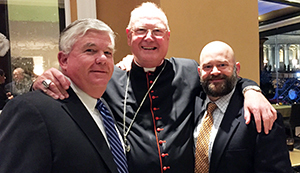 David Bender, chairman of the CEC advisory board, left, with Cardinal Timothy Dolan and Carter Snead at the Synod on the Family
David Bender, chairman of the CEC advisory board, left, with Cardinal Timothy Dolan and Carter Snead at the Synod on the Family
The three-week-long Synod on the Family, which formally closed with a Mass Sunday (Oct. 25) in Rome, brought 270 cardinals, archbishops and priests from around the world for what may have been the most significant and consequential such church gathering since the Second Vatican Council half a century ago.
The University of Notre Dame was present at the Synod, too, as its Center for Ethics and Culture joined Cardinal Timothy Dolan, archbishop of New York, in sponsoring three weekly evening receptions for the Synod Fathers, lay observers and media in the rooftop terrace garden of the Residenza Paolo VI Hotel overlooking St. Peter’s Square.
“We were honored that Cardinal Dolan asked the Center for Ethics and Culture to co-sponsor these receptions, for the purpose of allowing the Synod Fathers to meet in an informal setting, to form and deepen their friendships, and to promote an atmosphere of collegiality in their formal deliberations,” said O. Carter Snead, William P. and Hazel B. White director of the center and professor of law at Notre Dame. “We are proud that through our work, the University of Notre Dame had a positive and constructive presence at the Synod.”
Cardinal Dolan performed as master of ceremonies for all three receptions, which were well-attended by Synod participants and observers alike. On the evening of Oct. 6, Archbishop Diarmuid Martin of Dublin led a discussion in which he reminisced about the 1980 Synod on the Family in which he was a participant, and on Oct. 12, reception guests heard from Monsignor Livio Melina, president of the Pontifical John Paul II Institute for Studies on Marriage and the Family, and Bishop Jean Laffitte, secretary of the Pontifical Council on the Family.
On Oct. 20, Cardinal Dolan invited Snead to address the reception on the recent U.S. Supreme Court decision, Obergefell vs. Hodges, which legalized same-sex marriage, and its implications for the work of the Synod.
Acknowledging that the 69.4 million Catholics in the United States represent only 6 percent of the world’s Catholic population, Snead said that the decision was important for the Synod “because the law generally, and U.S. Supreme Court decisions in particular, profoundly shapes the attitudes and judgments of the American people about fundamental human goods. And, for better or worse, once Americans develop a strongly held view on such matters, it is rapidly exported around the world.”
According to Snead, the Supreme Court decision’s “core animating premise is that the right to marriage is fundamental because it is essential to defining and expressing one’s identity. In other words, marriage is primarily a mechanism of self-expression.”
Snead said that a vision of marriage so “rooted in the ideology of radical expressive individualism” is deeply at odds with that of the Church, whose “vision of persons and our shared life together is one in which we are understood to be embodied souls (not mere wills), whose embodiment has meaning. We live not in isolation, but situated in relationships of solidarity and reciprocal indebtedness. Others have claims on us and we on them, whether we choose them or not. What is fundamental about persons is not that they can construct and pursue future-directed plans, but that they are made in the image and likeness of God, deserving of unconditional love and protection.”
Contact: O. Carter Snead, 574-631-8259 (office), 202-607-0963 (cell), osnead@nd.edu